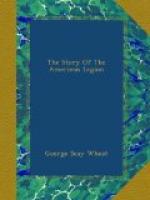With the war gone, with thousands of young men thrown upon their own initiative and resources for both work and play, there is going to be a great need of proper guidance, companionship, and comradeship, unless a great many are to be overtaken by some madness like Bolshevism or in a lesser degree—constant and brooding dissatisfaction. The American Legion post, with its leaders, is going to fill a great need here. It will be some place to go where a man can meet his fellows of the better type, and, not only indulge in the pleasure of discussing former days but, better still, take an interest in present-day movements affecting his country.
Also, I feel that Community Service will have a great place in this same scheme: that it can take the former service man, lonely and seeking expression, just where the Legion leaves off and, with Legion ideals on Americanism and the duties of citizenship as a basis, can round him off in the softer, more intimate molds of life, so that between the two he may not be only an honor to his country, but to his family and to his God as well. Therefore, I believe Community Service will fall heir to the goodwill created by War Camp throughout the nation, that it will retain the best of the latter’s tenets and will take its place as one of the great powers for good in the community life of this country.
At the final session, Major Caspar G. Bacon was elected treasurer of the Legion to serve until November 11th. Delegations appointed State chairmen and secretaries to carry on the work of further organization for the November convention.
During luncheon time of the last day there had been some fear expressed among certain of the delegates that the loyal foreign-born element in the United States might not thoroughly understand the Alien Slackers Resolution. In order to make that perfectly clear Chaplain Inzer, during the last hours of the caucus, called for a cheer for every foreign-born citizen who gave loyal service to the United States. A rousing one was given.
Then came the unanimous report of the Committee on Constitution and By-Laws and declaration of principles. It was passed upon, section by section. You will find it printed elsewhere in this volume, and you must read it if you would get a true view of the principles underlying the Legion. It is as plain as a lesson in a school reader. Any comment on it from me would be editorial tautology, so I don’t want to say anything more than that its framing was one of the cleverest and most comprehensive bits of work done since the very beginning of the Legion.




